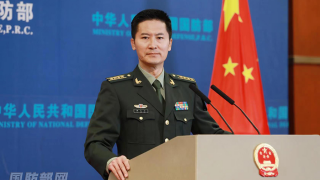By Yang Zhen and Li Lun
The Defence Committee of UK's House of Commons held a meeting on the expansion of the trilateral security partnership between the US, UK and Australia, which known as the AUKUS, in early February, in an attempt to include India and Japan. Although this plan is still in the pipeline, the UK's intention to expand the AUKUS has attracted widespread attention from international public opinion.
The US, UK and Australia claimed that the establishment of the AUKUS was to promote peace and stability in the Asia-Pacific region. However, they are engaging in the Anglo-Saxon coterie in an attempt to establish an Asia-Pacific version of NATO.
Everything seems to have gone wrong in the UK since Brexit came into effect in 2020. It has not only been economically depressed, but also politically isolated by Western European countries. Against this unfavorable situation, the UK has no choice but to continuously strengthen its special relationship with the US to improve its own situation with the help of the US. The reason why the British government brought the expansion of the AUKUS to the table this time is to actively work with the US's "Indo-Pacific Strategy" and to prove its strategic value to the US, so it can improve its position in the geopolitical game.
In fact, Britain has been tilting towards the Asia-Pacific in recent years in terms of defense and foreign policy in order to strengthen its influence in the Asia-Pacific region. The British government released Global Britain in a Competitive Age: the Integrated Review of Security, Defense, Development and Foreign Policy in 2021. This report clearly pointed out that the Asia-Pacific region is the power source of future global economic growth and will also be the priority of British foreign policy. In January 2023, Britain and Japan signed the Reciprocal Access Agreement (RAA) aimed at strengthening bilateral defense and security cooperation. This agreement has the quasi-alliance significance and allows the two sides to deploy armed forces on each other's territory.
In addition, the UK has actively cooperated with the US to contain China's development in order to gain a bargaining chip against China. Especially after Rishi Sunak took office, the UK government has repeatedly suppressed Chinese companies and released the so-called Six-monthly Report on Hong Kong, which grossly interfered in China's internal affairs and seriously violated international law and basic norms of international relations. The UK intends to draw Japan and India into the AUKUS to create camp confrontation and follow the US in its all-around containment and bottomless suppression of China.
The purpose of Britain's intervention in Asia-Pacific affairs runs counter to the general trend of peaceful development in the Asia-Pacific region, and it is bound to cause strong opposition from peace-loving countries in the region. Seeking peace, development, cooperation and a win-win situation are the common aspirations of all countries in the Asia-Pacific region. Any attempt to disrupt the situation in the Asia-Pacific region is bound to fail.
The world today is undergoing profound changes unseen in a century. The Ukraine crisis has made the international community fully aware of the dangers of the Cold War mentality and camp confrontation. The Asia-Pacific region, which suffered from conflicts and wars, was able to embark on the fast track to modernization and created the "Asia-Pacific Miracle" because it got rid of the haze of the Cold War.
History has taught us that mankind has a shared destiny, and cooperation is the right way in the world. The Asia-Pacific region is not someone's clique, and it should not become an arena for games between major powers. The US, Britain and other Western countries insisting on making waves in the Asia-Pacific region will be cast aside by the world.











